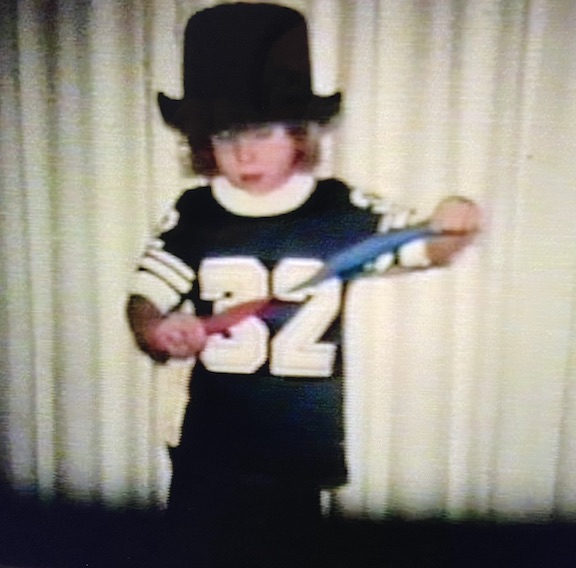
EVERYTHING YOU WANTED TO KNOW ABOUT MAGIC BUT WERE AFRAID TO ASK — When I was very young, the books that defined the world of magic and drew me into it were by Robert Parrish: New Ways to Mystify and For Magicians Only. They still speak to me like no others. I would hope that a modern reader would be similarly enthralled by How Magicians Think, a more ambitious introduction to magic by Joshua Jay. This new book will either seduce the reader into our dark side or at least make him a more savvy appreciator of the art. The Magic Castle’s AMA should donate a copy to each of its associate members.
It might have been more accurately titled How Joshua Jay Thinks, and that wouldn’t be a bad thing. I know of no one in modern times who has so thoroughly immersed himself in magic. I have been a fan from the get go. I first met Josh when he was about 14, at one of the Desert Magic Seminars at the Tropicana. Today I am as old as his father might have been, and in turn I lost a son, on his last day of kindergarten, whose name was Joshua. Sad coincidences aside, there is no other connection but magic, though I did feel parental concern when Josh, at 17, embarked on a nine-month trip around the world. I shouldn’t have worried. He did fine and has since continued to follow magic wherever it takes him as his new book explains.
The format is simple. Josh asks 52 questions, and, though he sometimes answers with a single word (Was Harry Houdini the Greatest Magician Ever?), he usually answers with an essay or memoir. Every answer is fascinating. Obviously, if you are reading the book from the viewpoint of a magician, you can concoct your own answers.
A few cases in point …
Who Are Your Favorite Magicians?
This question comes in a Part 1, Part 2, and Part 3, yielding a who’s who of magic: Jerry Andrus, Rune Klan, Richard Turner, Rene Lavand, Ricky Jay, Simon Aronson, Jeff McBride, Derren Brown, Rob Zabrecky, David Williamson, and Tommy Wonder. I have seen all perform live except Derren and would find it hard to dispute Josh’s choices. His relationship to each makes for fascinating reading. As to whether you might differ from the selections, Josh notes that he limited them to magi the lay reader has probably never heard of (that is, he excluded Penn & Teller, David Copperfield, and David Blaine). He also observed “But magic is like music: You’re imprinted for life by whatever is happening when you’re fifteen years old. Tommy Wonder was the magic of my youth.”
Who Is Your Very Favorite Magician?
Juan Tamariz. Josh does a masterful job of portraying Juan in print, for newbies, and expands for the rest of us what life is like for Jun at his part-tome home in Argentina, turning in after a night of magic creation at eight in the morning, then sleeping until five in the evening and doing it all again, with a nice meal at midnight.
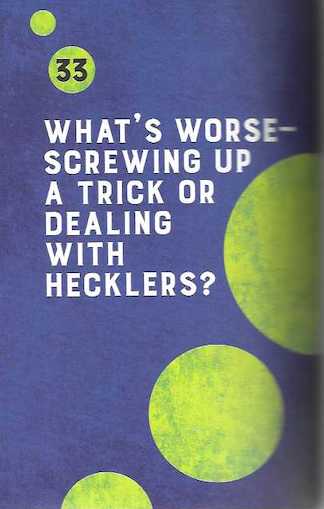
Do Magicians Get Fooled?
All the time. For Josh, one of those times was at the hands of his friend Rune Klan: “Rune’s show began with him waling onstage with only a large cloth—no set, no boxes, no trapdoor. He waved the cloth in the air and covered himself briefly. When the cloth fell, he was leaning against a motorcycle. The engine roared. I was fooled. Badly.” To my delight, Josh reveals the secret in this book.
I should confess that one of those times for me was at Josh’s hands. He was performing his one-man show Unreal in Las Vegas and included a miracle Borrowed Ring to Wineglass routine.Neither I nor my friends had a clue. Still don’t!
What Makes David Copperfield So Iconic?
I’ve read various accounts of David Copperfield’s museum, usually as a bonus tour for some convention, and I recently enjoyed Homer Liwag’s photo tour in the new Copperfield book. But I have never read a more thrilling account of David’s aircraft hangar and museum than this 12-page record of a “normal” tour. Said tour is limited to five guests and is conducted by David himself. It begins around 1:00 a.m., after the day’s magic shows are in the books. This particular contingent included Joshua Jay, Eddie Dawes, Patrick Culliton, and a friend of Patrick who was blind. In the middle of the night, they came across Mike Caveney who was reorganizing the library. It’s a fine account, just like being there. David himself was the perfect host.
Is Magic Memorabilia Valuable?
Josh contrasts his own collection (which includes an original Discoverie of Witchcraft, a Tamariz top hat, and Houdini’s Needles) with those of David Copperfield and ken Klosterman. The gem in this lengthy piece is the exhausting Klosterman collection, housed in not one but three locations in Ohio. Most interesting! This was the first time I had read that the Klosterman subterranean collection might not have been as deep as legend has it, that it is something of magic trick. I love this book.
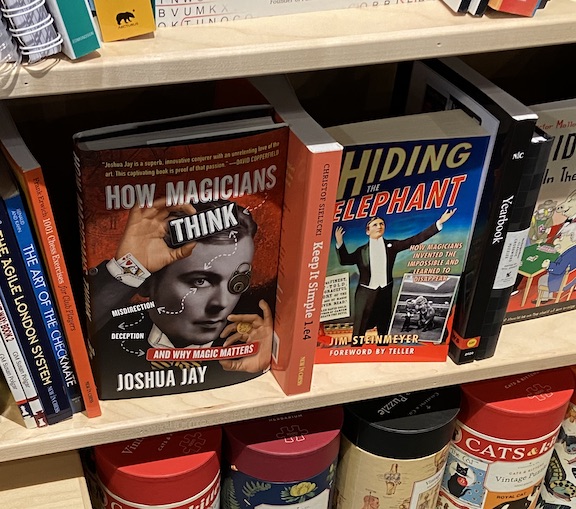
And so on, touching on topics such as why magicians don’t repeat tricks, what happens if they reveal secrets, how to create magic, how the brain is fooled, how often magicians practice, why magic is male-dominated, how to build a magic show, how magicians use technology, why some people hate magic, what is your most difficult trick, what to think about when performing, screwing up a trick vs. dealing with hecklers, why there aren’t more Black magicians, what makes Penn & Teller so dynamic, what magicians do in secret, the Magic Castle, is David Blaine for real, can a magic trick be too good, why magicians have big egos, is there real magic in the universe, and what is the next big thing in magic, plus more. Fifty-two chapters in all.
At your local bookstore from Josh’s real-world publisher, Workman Publishing (but you can get it from Vanishing, Inc.), hardback, 321 pp, all chapter titles illustrated in color, a bargain at $24.95
SILLY LOVE SONGS --- Many of you have no doubt considered that a good magic trick is like a good song. Each is a little over three minutes, each is a nugget of entertainment, each, if expertly performed, can stir strong emotions and form lasting memories. And if you are a magician or a musician, each can inspire you to perform it yourself. Each, at the bet of times, can become wildly popular. A scant few become classics.
I was thrilled to receive, during the recent holiday season, one of the bestselling box sets Paul McCartney The Lyrics. The Beatles seem to transcend generations. I am old enough to have grown up during the classic era of rock and roll (Buddy Holly, Elvis, Chuck Berry, etc.), that first era delimited by the emergence of the Beatles. My children, born after the Fab Four broke up, became Beatles fans on their own. And now my grandchildren are listening to and performing Beatles music. Classics indeed.

Paul McCartney wrote or collaborated on 154 songs between 1956 to the present, and all the lyrics are in these two handsome volumes, accompanied by essays that describe what was going on during Paul’s life, the life of the Beatles or his later bands, or in the world at large. It’s a grand page-turner of a book, illustrated with scads of great photos. I read the book nonstop and immediately purchased sets for my kids, as i knew they would enjoy them. A suggestion: you can read each song’s story with Alexa nearby, to hear the song under discussion.
I know, it isn’t about magic, but it is about entertainment and creativity, and I see many parallels between the art forms. I would love to read a similar book keyed to popular card tricks.
Hardback, dust covers, boxed, by Paul McCartney and Paul Muldoon. I originally found two editions on Amazon, one published by a U.S.house and the other, slightly less expensive, by a different published in Great Britain.Wonderful!

LIIAR LIAR, PANTS ON FIRE — A highlight of the pandemic broadcasts covered here in Conjuring in Quarantine was the Magic Collectors’ Corner Online series, from David Sandy and Lance Rich and a host of supporters. New episodes are now appearing monthly, and the best bit for January was a game called “I Call B.S.!,” similar to the "Sys You!" Saturday morning radio pquiiz on NPR. In the game, David would display some magical item, after which Brad Henderson, David Charvet, and zMike Caveney would give wildly divergent explanations of what the item was. Three contestants (preselected) had to guess who was lying, who was telling the truth.
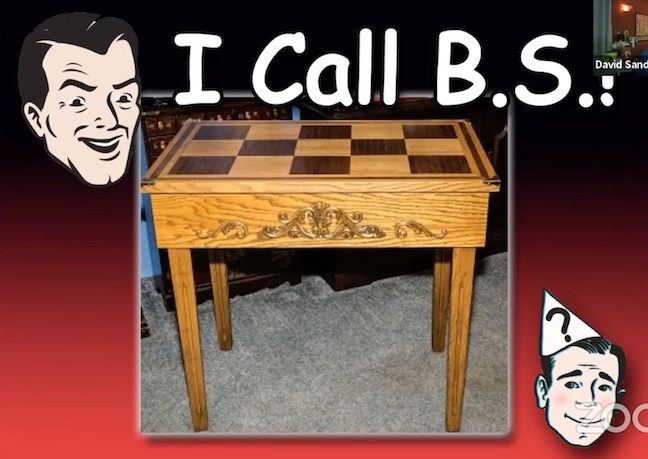
Shown above is the second item for consideration. Brad thought it was a table used by psychics and fraudulent spirit mediums for obtaining information, Mike thought it was a black art table used with the Cone and Beans trick, and David thought it was for use in a Bob HaHaskell gambling demonstration. Can you guess? All three panelists proved to be consummate liars and fooled me every time. What fun!

RIGHT ON EVERY LEVEL — Deep into this month we all learned that Amazing Johnathan has died, almost eight yers after he had been given a year to live and well after many fellow magicians, including such close friends of his as Brian Gillis, had died. Whenever anyone this vital dies, it feels as if there is disturbance in the force.
I was privileged to have interviewed Johnathan for two issues of Genii, his cover issue (19 pp) in September 2000 and a piece on his fabulous home (“Phantom Manor,” 6 pp) in December 2004. If you are a Genii subscriber, I urge you to revisit those issues for a great time. The cover issue especially, as it includes “Amazing Johnathan Interview” (hilarious), “Billy McComb: My Life with AJ” (interview with Billy), “My Dinner with AJ” (two AJ stunts you can do at dinner), and “Bedlam at Ballys’ (review of AJ’s show in a silo at Tunica, Mississippi).
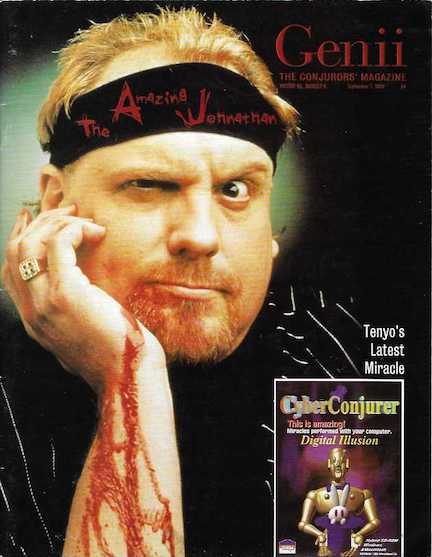
Shortly after the cover issue appeared, I visited Hollywood Magic. They had copies of MAGIC for sale, but none of Genii. I asked why. “Oh, that sold out,” I was told. Yes!
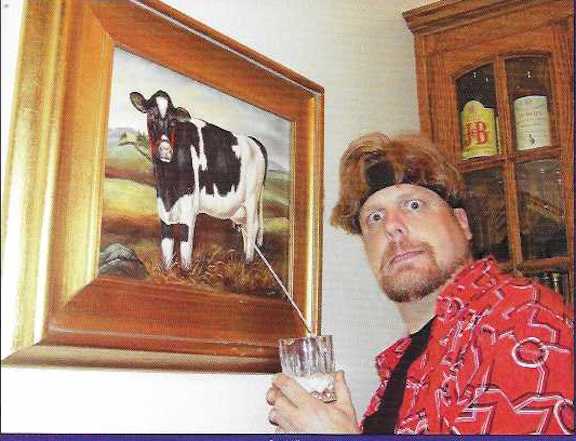
I also urge you to click back to Little Egypt Magic September 2000 for “An Amazing Farewell,” the stuff that didn’t make it into Genii.
Amazing Johnathan was giftedly, naturally funny and one of the nicest guys in magic. I’ll close with his responses to an interview, circa 2000.
Q: What will they say about Amazing Johnathan 100 years from now?
A: (First response) I can’t believe he was gay. I can’t believe he was gay the whole time.
Q: What will they say about Amazing Johnathan 100 years from now?
A: (Second response) The Laughs per Minute thing is the most important thing that I had. LPMs. I had more LPMs than any comic magician. And boy he had a big head. A big old head.





